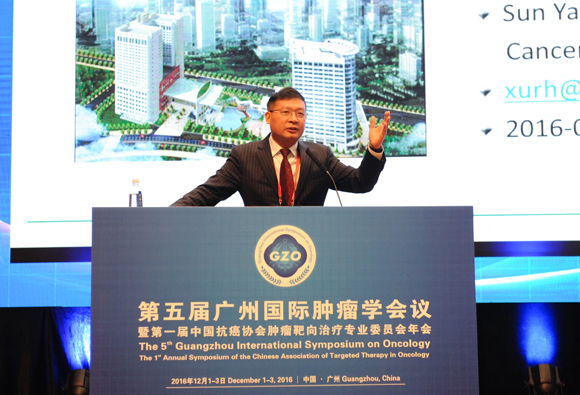Source: Cancer Center
Written by: Cancer Center
Edited by: Wang Dongmei
Organized by the Guangdong Provincial Anticancer Association, the Chinese Association of Targeted Therapy in Oncology, the US Chinese Anti-Cancer Association (USCACA), Sun Yat-sen University Cancer Center (SYSUCC) and the Chinese Journal of Cancer, the 5th Guangzhou International Symposium on Oncology was held on December 1-3, 2016, at the Baiyun International Convention Center in Guangzhou, China. With over 2,000 people participating in the event, the symposium was a great success, attendees included more than 250 famous specialists, from both China and abroad. This year, there were 2 main sessions followed by 15 parallel sessions for different types of cancer and treatments, with a special emphasis on precision medicine.
The opening ceremony was hosted by Vice President of SYSUCC Prof. Qian Chaonan. Academician Zhan Qimin from Peking University Health Science Center, SYSU Vice President Prof. Yan Guangmei, Conference Chairs SYSUCC President Prof. Xu Ruihua and Prof. Wei Zhang of Wake Forest Baptist Comprehensive Cancer Center, all gave speeches.
The opening ceremony
On behalf of the Chinese Anti-Cancer Association, Academician Zhan Qimin expressed his appreciation for all the efforts and contributions made by the Guangzhou International Symposium on Oncology over the years, for their academic exchanges concerning oncology.
On behalf of SYSU, Prof. Yan Guangmei expressed his gratitude to the attendees, as well as praising SYSUCC; he hoped that SYSUCC continues to be the leading force in providing first class medical services and cancer research, with even greater courage and wisdom.
SYSU Vice President Yan Guangmei delivering a speech

SYSUCC President Xu Ruihua delivering a speech
President Xu Ruihua welcomed experts, scholars, friends and guests from afar. He said that “The Guangzhou International Symposium on Oncology is focused at the forefront of oncology issues towards building a more extensive, high quality and efficient cooperation and exchange platform for both domestic and foreign counterparts, and will become a top level academic event with international influence.”
On behalf of the US Chinese Anti-Cancer Association (USCACA), Prof. Wei Zhang expressed his gratitude for the opportunities to coorganize such exciting and successful conferences over the past several years. He added that, one of the USCACA's missions, is to help bridge the gap between Chinese and American research in the field of oncology as well as in the clinical field, with the hope that more cooperation projects can be carried out in the near future to greater improve many aspects of cancer research, and ultimately treatment. Prof. Wei Zhang also announced the winners of the USCACA-NFCR Scholars Award and the Excellent Article Award for the conference.
As the most influential academic cancer symposium in South China, the conference continues to uphold the principle of "paying attention to the forefront of academic development and strengthening domestic and international academic exchanges". In order to meet this goal, the conference recruited a range of renowned professors and academics from both a national and international level. Some of whom included, Academician Zhan Qimin from Peking University Health Science Center, Academician Zeng Yixin from Beijijng Hospital, Academician Yu Jinming from Shandong Cancer Hospital, Academician Chen Guoqiang from Shanghai Jiao Tong University School of Medicine, Academician Zhang Zhiyuan from Shanghai Jiaot Tong University School of Medicine, Academician Lin Dongxin from SYSUCC, Prof. Cunyu Wang from University of California, Los Angeles, Prof. Wei Zhang from Wake Forest Baptist Comprehensive Cancer Center, Prof. Bin S. Teh from Houston Methodist Hospital, Prof. Ju-Seog Lee from MD Anderson Cancer Center, Prof. Kang Zhang from University of California, San Diego, and Prof. Yihai Cao from the Karolinska Institute. With a combination of basic, clinical and translational research, the conference as a whole focused on the innovation of cancer research and new treatment models. The speakers shared their latest research and perspectives on a range of oncological related disciplines and sub-disciplines, with an emphasis on precision medicine.
There were fifteen parallel sessions based on different cancer disease types. Experts from different fields in basic and translational research and many clinical front-line doctors gathered to discuss and further explore hot issues of different cancer diseases, including multidisciplinary treatment models as well as various types of new methods for tumor therapy such as immunotherapy, targeted therapy and radiation therapy. The sharing of experiences and exchanging of information in regard to basic theory, clinical methods and academic achievements have promoted the improvement of academic level and exerted a positive impact on the development of disciplines in the field.
President Xu Ruihua expressed that the successful experiences throughout the past four symposiums have led to the accumulation of knowledge and academic influence, and he hoped that this one will follow suit as the conference continues to grow. “We hope that the Guangzhou International Symposium on Oncology will continue to promote innovation and cooperation in the field of cancer research and bring with it new energy and impetus in the development of cancer prevention and treatment, promoting the progress of oncology at home and abroad. Hand in hand.”



